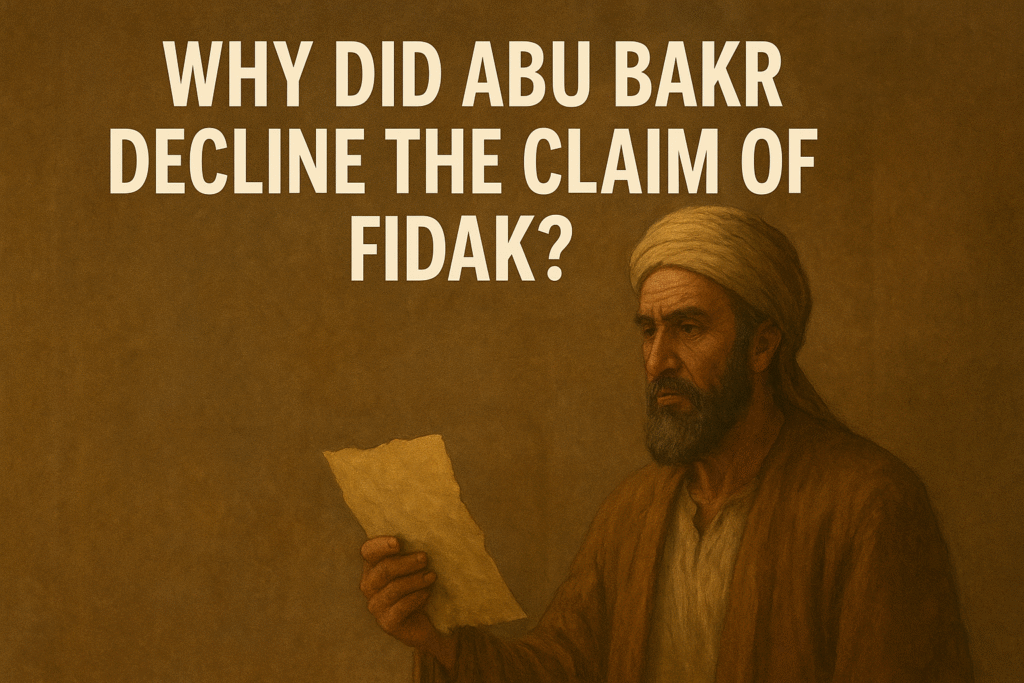Table of Contents
- Introduction
- What is Fidak in Islam?
- Historical Background of Fidak
- Prophet Muhammad (s.a.w.w) Gifting Fidak to Bibi Fatima (s.a)
- The Claim of Fidak After the Prophet’s Demise
- Why Did Abu Bakr Decline Fidak?
- Debate Between Bibi Fatima (s.a) and Abu Bakr
- Sunni and Shia Narrations on Fidak
- Aftermath of the Dispute and Impact on Ahlul Bayt (a.s)
- The Role of Umar ibn al-Khattab in the Incident
- Legacy of the Fidak Dispute
- Lessons for Muslims Today
- Frequently Asked Questions (FAQ)
- Conclusion & Dua
Introduction
The issue of Fidak is one of the most sensitive and defining episodes of early Islamic history. What appears to be a simple matter of property actually represents a deeper conflict about rights, justice, and the position of Bibi Fatima (s.a), the only daughter of Prophet Muhammad (s.a.w.w).
One of the most pressing questions is: Why did Abu Bakr decline the claim of Fidak from Bibi Fatima (s.a)? To answer this, we must study the historical background of Fidak, the Prophet’s gift to his daughter, Abu Bakr’s reasoning, and the consequences of this decision on the household of Ahlul Bayt (a.s).
What is Fidak in Islam?
Fidak was a fertile agricultural land located near Khaybar. It was acquired by Prophet Muhammad (s.a.w.w) after the Jews of Khaybar surrendered peacefully, without a battle. According to Qur’an (59:6–7), such land belonged exclusively to the Prophet.
Rather than keeping it for personal use, Prophet Muhammad (s.a.w.w) distributed much of its produce for the welfare of Muslims. Importantly, he gave the land of Fidak as a gift to his daughter Fatima (s.a) during his lifetime.
Reference: Al-Kafi, vol. 1, p. 543
Historical Background of Fidak
After the Muslims’ victory in Khaybar in 7 AH, the Jews of Fidak approached the Prophet to surrender half their land in exchange for peace. This land became part of the Prophet’s personal property. He used it to support the poor, orphans, and travelers.
Later, the Prophet gifted the entire estate of Fidak to his daughter Fatima (s.a). This transfer is mentioned in both Sunni and Shia sources.
Reference: Tarikh al-Tabari, vol. 3, p. 221
Prophet Muhammad (s.a.w.w) Gifting Fidak to Bibi Fatima (s.a)
Several narrations confirm that the Prophet gifted Fidak to Fatima (s.a).
- Shia Sources:
- Al-Kafi, vol. 1, p. 543
- Bihar al-Anwar, vol. 29, p. 189
- Sunni Sources:
- Musnad Ahmad ibn Hanbal, vol. 1, p. 47
- Ansab al-Ashraf, vol. 1, p. 582
Thus, Fidak was legally and rightfully owned by Bibi Fatima (s.a) during the Prophet’s lifetime.
The Claim of Fidak After the Prophet’s Demise
When Prophet Muhammad (s.a.w.w) passed away in 11 AH, the new caliph Abu Bakr took control of state matters. Bibi Fatima (s.a) went to claim her land of Fidak. However, Abu Bakr rejected the claim, arguing that the Prophet had reportedly said:
“We, the Prophets, do not leave inheritance; what we leave behind is charity.”
(Sahih al-Bukhari, Book 51, Hadith 19)
This statement became the cornerstone of Abu Bakr’s decision to deny Fatima’s (s.a) request.
Why Did Abu Bakr Decline Fidak?
Abu Bakr’s reasoning rested on the hadith that prophets leave no inheritance. However, Fatima (s.a) contested this by presenting Qur’anic verses that spoke of prophets leaving inheritance to their children, such as:
- “And Solomon inherited David.” (Qur’an 27:16)
- “Zechariah prayed for a son to inherit from him and from the House of Jacob.” (Qur’an 19:6)
Fatima (s.a) argued that if prophets did not leave inheritance, these verses would contradict that claim.
Thus, her position was that either Fidak was a gift during the Prophet’s lifetime or at minimum, an inheritance after his death. Abu Bakr refused both interpretations.
Debate Between Bibi Fatima (s.a) and Abu Bakr
The debate is preserved in historical sources. In her famous sermon known as the Khutbah Fadakiyya, delivered in the Prophet’s Mosque, Fatima (s.a) passionately defended her claim. She cited Qur’an, emphasized her right, and reminded the community of her father’s gift.
Reference: Bihar al-Anwar, vol. 29, p. 223
Despite her arguments, Abu Bakr maintained his stance. Shia historians record that Umar ibn al-Khattab pressured Abu Bakr into taking this hardline decision, while Sunni historians present Abu Bakr’s action as a matter of state law.
Sunni and Shia Narrations on Fidak
- Shia Narrations: Strongly emphasize that Fidak was a gift, confirmed by witnesses like Imam Ali (a.s) and Umm Ayman.
- Sunni Narrations: Acknowledge the claim but prioritize the hadith of no inheritance from prophets, reported by Abu Bakr and a few companions.
This difference highlights the theological divide between Shia and Sunni interpretations of history.
Aftermath of the Dispute and Impact on Ahlul Bayt (a.s)
According to Sahih al-Bukhari (Book 59, Hadith 546), Fatima (s.a) was deeply hurt by the refusal and stopped speaking to Abu Bakr until her death. She passed away only a few months after her father, in a state of grief and oppression.
The dispute over Fidak thus became one of the reasons behind the estrangement between Ahlul Bayt (a.s) and the ruling caliphate.
The Role of Umar ibn al-Khattab in the Incident
Shia historical sources (Tarikh al-Tabari, vol. 2, p. 233) narrate that Umar threatened to burn the house of Fatima (s.a) if Imam Ali (a.s) refused allegiance. This event, coupled with the denial of Fidak, intensified the oppression faced by Bibi Fatima (s.a) and contributed to her martyrdom.
Legacy of the Fidak Dispute
- For Shia Muslims, Fidak symbolizes the denial of Ahlul Bayt’s (a.s) rights and the beginning of political injustice after the Prophet.
- For Sunni Muslims, the incident represents Abu Bakr’s attempt to protect communal assets, though they acknowledge the pain it caused Fatima (s.a).
Even later caliphs revisited the issue. Umar ibn Abdul Aziz restored Fidak to the descendants of Fatima (s.a), but it was seized again after his death.
Lessons for Muslims Today
- Justice must prevail over politics – leadership should protect rights, not deny them.
- Women’s rights in Islam must be respected, as taught by the Prophet (s.a.w.w).
- Unity requires truth – Muslims must acknowledge historical events with honesty.
- The courage of Fatima (s.a) inspires believers to stand against injustice, even when isolated.
Frequently Asked Questions (FAQ)
Q1: What was Fidak in Islam?
Fidak was fertile land near Khaybar, given by Prophet Muhammad (s.a.w.w) to his daughter Fatima (s.a).
Q2: Why did Abu Bakr refuse to return Fidak?
He cited a hadith claiming prophets do not leave inheritance.
Q3: Did Bibi Fatima (s.a) own Fidak during the Prophet’s lifetime?
Yes, many Sunni and Shia narrations confirm it was gifted to her.
Q4: What was Fatima’s (s.a) response?
She delivered the famous sermon of Fadak, citing Qur’an and demanding her rights.
Q5: What happened after the dispute?
Fatima (s.a) stopped speaking to Abu Bakr and died in grief. Her grave remains hidden.
Conclusion & Dua
The denial of Fidak to Bibi Fatima (s.a) was not a mere legal matter but a defining moment in Islamic history. It highlighted the struggle of Ahlul Bayt (a.s) against political power, the tension between Qur’an and hadith interpretations, and the pain endured by the beloved daughter of the Prophet.
May Allah grant us the ability to study history with honesty, respect the family of the Prophet, and uphold justice in our lives.
Allahumma salli ‘ala Muhammad wa Aali Muhammad

